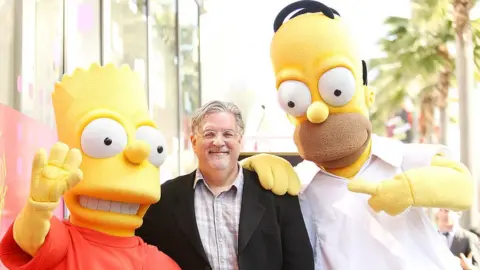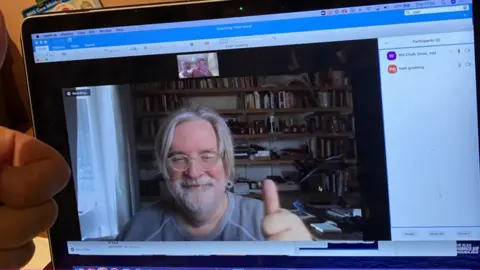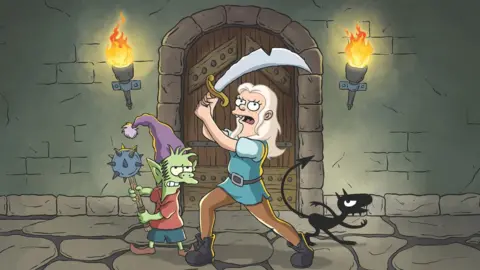The Simpsons creator Matt Groening on equality, memes and monorails
 Getty Images
Getty ImagesThe Simpsons creator Matt Groening doesn't do many interviews. Apparently, he announces at the start of ours, he doesn't "have much more to say".
Forty minutes later, after diving through topics from his latest Netflix show to memes and... er, monorails, it's clear he was wrong - there's plenty still to discuss.
Not least, accusations that some of The Simpsons' ethnic minority characters, all historically voiced by white actors, encourage harmful stereotypes.
After a backlash prompted by a 2018 documentary called The Problem With Apu, the show has spent the last year re-casting its non-white roles.
"Times change," Matt tells us, "but I actually didn't have a problem with the way we were doing it.
"All of our actors play dozens of characters each, it was never designed to exclude anyone."
At first, the show's response was along these lines too. Within an episode, Lisa looked directly into the camera, saying: "Something that started decades ago and was applauded and inoffensive is now politically incorrect. What can you do?"
Eventually, though, The Simpsons backtracked and announced it was making changes after all.
The latest came on Monday, when it was reported that Harry Shearer is to be replaced as the voice of Dr Hibbert by Kevin Michael Richardson, known for his voice work on American Dad! and Family Guy.
Asked whether he regrets how they handled it, Matt says: "At a certain point it doesn't matter what you say. You're going to be attacked by whoever, you know?
"We're not going out of our way to comfort bigots. On the other hand, if you do any kind of gesture and people perceive a weakness, you'll be criticised."
He does, however, accept that change was needed - and not just with actors, but across the entire industry.
"I absolutely agree with that. And we're trying to make it better," he says.
"Bigotry and racism are still an incredible problem and it's good to finally go for more equality and representation."
Matt is speaking to us over Zoom from the chair he's been "sitting on since the beginning of the pandemic".
He's working on new episodes of his Netflix series, Disenchantment, but before we got into that, we had to address the monorail in the room.
When he first doodled a smiley yellow family, he probably didn't expect, 30 years later, to be apologising to the monorail community.
He looks a bit upset when we point out that The Monorail Society, made up of 14,000 members worldwide, is on record saying The Simpsons has a lot to answer for.
"I don't know what to say, I'm sorry," he laughs, "That's a by-product of our viciousness."
 Getty Images
Getty ImagesThe episode we're talking about - one of the show's most iconic - is Marge Versus the Monorail, where the town of Springfield is conned into ploughing all its money into a doomed public transport system.
It was first shown in 1993, but became so popular with fans that it's been blamed for the fact single-railed trains aren't always taken as seriously as their double-railed cousins.
"You're up off the ground and you're above traffic. Monorails are great," Matt says.
"So it makes me sad, but at the same time if something's going to happen in The Simpsons, it's going to go wrong, right?"
A small impact on town planning is possibly not that big a deal in the context of a show that's been going longer than many of its fans have been alive, is broadcast in dozens of languages, and has predicted the future several times.
"It's unbelievable," Matt says. "I just couldn't have imagined it back in the day when I was a struggling cartoonist, drawing on a wobbly card table in my kitchen."

All big Simpsons fans probably spend more time than we'd like to admit scrolling through Simpsons meme pages.
But surely the man who invented the whole thing can't be as sad as the rest of us, can he?
"Yes! Of course I look at the memes", Matt laughs, "some of them are great, some of them make me cringe.
"Back in my pre-animation days, I had a weekly comic strip called Life in Hell. I remember walking down the street and seeing a newspaper in the gutter covered with water, but it had my strip on it.
"It made me feel like I'd arrived, that I was part of the landscape. Now with fan art and cosplay and memes, it's just a global version of the newspaper in the gutter."
 Netflix
NetflixDisenchantment, which is now on its third series, is about "taking the genre of fantasy and fairy tales and seeing how far I can go with it," Matt says.
Even though he's technically crept past retirement age, he's got no plans to stop any time soon - and says he's got ideas in the pipeline for other shows too.
"Doing Disenchantment is about the most fun I ever have. I get to work with some of the funniest smartest people around and play with them and tell stories. It's just a blast.
"I have a bunch of kids, and they're downstairs right now playing and I feel like I'm up here in my office playing too."


